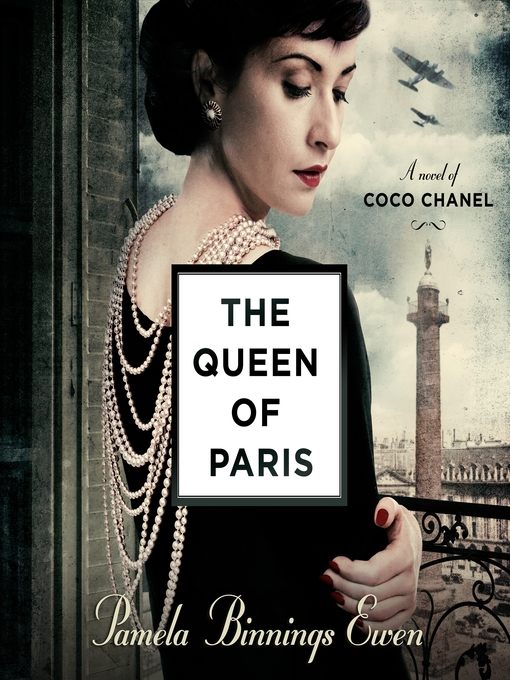
The Queen of Paris
A Novel of Coco Chanel
کتاب های مرتبط
- اطلاعات
- نقد و بررسی
- دیدگاه کاربران
نقد و بررسی

In a lilting voice, Gabrielle de Cuir performs this fascinating fictional memoir of Gabrielle Bonheur "Coco" Chanel (1883-1971). She primarily looks back upon her actions during WWII, along with flashbacks that take place from 1903 through the 1920s. As de Cuir narrates in a flowing style, Chanel describes her life as couturi�re, perfumer, and then Nazi spy and collaborator while living with her friend and protector, Baron Hans G�nther von Dincklage, at the Hotel Ritz in Paris, the Reich's High Command headquarters. De Cuir incorporates few accents, allowing the listener to focus on Chanel's unwavering drive to wrest control over her signature perfume, No. 5, from her Jewish business partner by using the Nuremberg laws. De Cuir's unbroken narration flows smoothly over jarring anti-Semitic slurs interlaced with Chanel's favorable comments on Aryans. M.B.K. � AudioFile 2020, Portland, Maine

Starred review from March 23, 2020
Ewen (The Moon in the Mango Tree) dazzles in this outstanding historical thriller that chronicles the life of Coco Chanel in occupied France. While staying at Paris’s Hotel Ritz in the spring of 1940, Chanel is approached by the Reich’s High Command to become a spy and sees an opportunity to take control of the company she’s built with her business partner, Pierre Wertheimer. As the war escalates, Pierre takes the secret formula of Chanel No. 5 to New York City, threatening Chanel’s control of her iconic fragrance. After becoming a German asset, Chanel attempts to use growing anti-Semitism and new Jewish laws under the Vichy government to her advantage to reclaim full control of her company. Her efforts bring her to the attention of powerful members of the German military, who push the limits of her national and personal loyalties as she goes undercover for the Nazis. Ewen’s Chanel is arrogant and fragile in equal measure, and the author does a marvelous job of digging into the motivations of a woman born into poverty as she defends the fortune she built for herself, making this a refreshingly nuanced character portrait and also a real page-turner. This is top-notch historical fiction. Agent: Julie Gwinn, The Seymour Agency.

March 6, 2020
Fashion designer Gabrielle "Coco" Chanel's perfume slogan was her core belief: A woman without Chanel No. 5 is a woman with no future. Contractually, she owned ten percent of the fragrance company, while perfumer Pierre Wertheimer claimed 90 percent. During World War II, Wertheimer immigrated to the United States, taking the perfume's formula with him. Chanel engaged in a legal battle to regain the formula, utilizing questionable methods such as invoking the Nuremberg Laws forbidding persons of Jewish heritage to own property over an Aryan, and spying for the Nazis to gain favor. (The suit was ultimately settled in favor of Wertheimer.) In her fictionalized biography, Ewen (The Moon in the Mango Tree) covers a broad span of years, 1904-44, with flashbacks detailing Chanel's early loves and losses, establishing youthful privation as her source of determination. Yet it's difficult to sympathize with a character so callous as to spend the war in the H�tel Ritz living in luxury alongside the Nazi High Command. VERDICT Utilizing first person for past scenes and third person for present scenes is generally off-putting and confounds the narrative. Readers of traditional biography may prefer Anne De Courcy's Chanel's Riviera, which also addresses Chanel's wartime spying.--Jessica Bushore, Xenia, OH
Copyright 2020 Library Journal, LLC Used with permission.

February 15, 2020
Coco Chanel schemes to save her company in Ewen's (An Accidental Life, 2013, etc.) novel based on the life of the fashion icon. 1940, France: Coco Chanel gets the devastating news that the man who financed her company and paved the way for her iconic success in the fashion industry has stolen the formula for Chanel No. 5. Betrayed and self-righteous, Coco does everything she can think of to thwart his plan, first by trying to buy out France's jasmine supply, and then by mounting legal countermeasures. One of her darkest weapons: her willingness to challenge Pierre's rights based on the fact that he is Jewish, for Paris soon falls under Nazi control. As she desperately fights to save her company, Coco also tries to make a deal with her lover, a Nazi spy, to save her nephew (really her son). Spatz agrees to help, as long as Coco will first travel to Spain, there to spy on her vast network of friends and acquaintances and uncover secret information that could bring Spain into the war as a German ally. Ewen's Coco is a proud and image-conscious character, sprung from a painful, lonely childhood to become a self-made triumph. A Machiavellian madame, she is quite willing to live comfortably in the Hotel Ritz in Paris, surrounded by Nazi officers, as the rest of her country falls to ruin, as the Jews are rounded up and "counted" and then begin disappearing. She's a hard character to like, but her uncompromising sense of self-worth does inspire grudging admiration at times. Unfortunately, this independent stance indirectly facilitates the horrors of the Holocaust. Perhaps the most uncomfortable effect of Ewen's story, then, is the way it makes the reader wonder: Would I have understood the true horror of the Nazis' plans any better than Coco? Would I have taken action, or would I, too, have let the war pass me by? More morality play than fashion fable; a reminder that fame does not always guarantee goodness or likability.
COPYRIGHT(2020) Kirkus Reviews, ALL RIGHTS RESERVED.

























دیدگاه کاربران